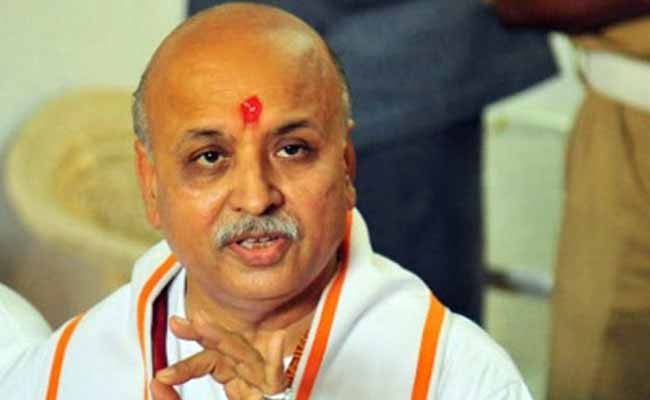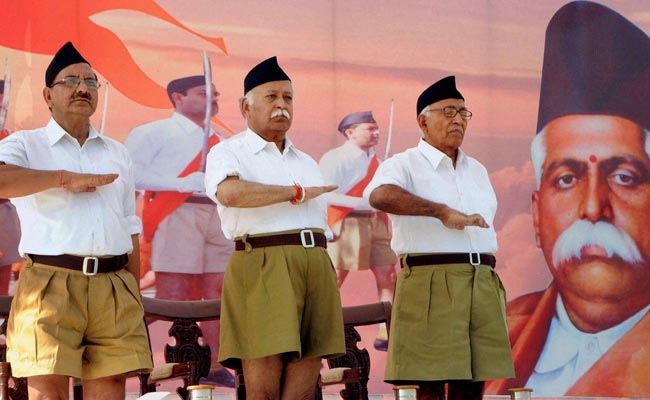On the agenda is a younger fresh team to lead the Sangh; its Number Two Suresh "Bhaiyyaji" Joshi, whose term comes to an end in March, is likely to offer to quit. RSS chief Mohan Bhagwat's term does not have an expiry date. The buzz in the larger Sangh Parivar is that his likely replacement and the biggest claimant for the powerful job is Dattatreya Hosabale, in his early 60s, who enjoys a particularly close relationship with Prime Minister Narendra Modi.

RSS leader Dattatreya Hosabale and Prime Minister Narendra Modi (File photo)
Despite Togadia's public drama before he was arrested in Gujarat last month - he went missing for 12 hours, seen as a tactic to dodge being arrested - Joshi objected to the "plants" that reported Togadia would be replaced.

VHP leader Pravin Togadia, who went "missing" last month, was found 12 hours later at a hospital in Ahmedabad (File photo)
Mohan Bhagwat, the RSS chief, also shares Joshi's views that the RSS cannot play second fiddle to the BJP in key decisions. Hosabale has a post-graduate degree in English literature and before he became a Pracharak (RSS worker), he was active in its student body, the Akhil Bharatiya Vidyarthi Parishad (ABVP). One of the things that has caused reservations on his candidature is the fact that he has not directly risen from an RSS Shakha or branch. He currently is one of the joint General Secretaries assisting Joshi, having risen quietly but spectacularly after Modi's ascent to PM.
The delicate balance of power between the RSS and the BJP stands to skew towards Modi if Hosabale gets the all-important No 2 post on account of his equation with Modi. With crucial elections looming in Karnataka, Rajasthan and Madhya Pradesh, a powerful lobby in the BJP is pushing to ensure that a generational change happens not just in the party but in the RSS, with Hosabale getting a promotion to ensure smooth coordination between the party and its ideological mentor.

File photo of RSS chief Mohan Bhagwat (centre)
This special relationship reportedly causes some disquiet for other Sangh favourites like union ministers Nitin Gadkari and Rajnath Singh. Gadkari, who had a bit of an uneasy patch with Modi over micromanagement, has reportedly made peace, but despite being announced as one of the government's representatives to Davos, he did not accompany Modi to the World Economic Forum. Sources close to him say that he has a record of visiting Davos every alternate year and not much should be read into his absence this year.

PM Narendra Modi delivering a keynote address at the World Economic Forum in Davos
The RSS feels that despite the tall claims made by the BJP, public support for the Modi government has been sliding. The RSS internal assessment is that if elections were held today, the BJP, which won 282 seats in 2014, would round up 200-220 seats. Sources say that the RSS has told BJP president Amit Shah that the upcoming Karnataka election is crucial because if the southern state goes saffron, the momentum will charge in Madhya Pradesh and Rajasthan and the general elections. Shah is learnt to have asked for full RSS support and smooth coordination.

BJP chief Amit Shah celebrating the party's victory in Gujarat and Himachal Pradesh
So the March gathering will address these potential outcomes. Sources say that once the decision is taken on whether Hosabale should replace Joshi, the focus will move quickly to an aggressive strategy for the general election, which the PM wants advanced. It's going to be a hectic March.
(Swati Chaturvedi is an author and a journalist who has worked with The Indian Express, The Statesman and The Hindustan Times.)
Disclaimer: The opinions expressed within this article are the personal opinions of the author. The facts and opinions appearing in the article do not reflect the views of NDTV and NDTV does not assume any responsibility or liability for the same.


